GE
-
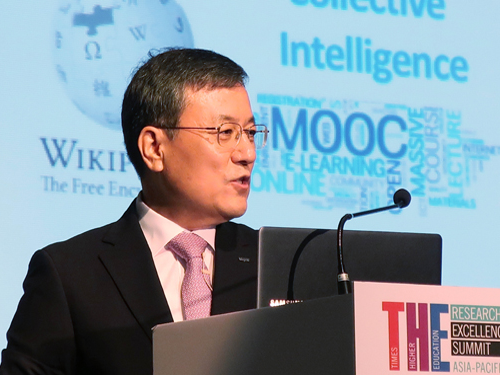 Reform of Universities Key in the Wake of the 4th Industrial Revolution
(President Shin makes a keynote speech at the Times Higher Education Research Excellence Summit held in Taiwan on July 4.)
KAIST President Sung-Chul Shin stressed that innovations in education, research, and technology commercialization of universities are critical for responding to the transformations that the Fourth Industrial Revolution will bring about.
In his keynote speech at the Times Higher Education Research Excellence Summit held in Taiwan on July 4, he cited connectivity, superintelligence, and convergence in science and technology as three components the Fourth Industrial Revolution will pierce, saying the speed and breadth of the transformation will be beyond our imagination. He also presented megatrends in science and technology in the years to come and how KAIST is addressing the challenges and opportunities.
“It is imperative to foster creative young talents fluent in convergence, collaboration, and communication skills in the new era. To this end, we need to focus on whole brain education by enhancing basic education in science and engineering plus humanities and social studies,” he stressed. He also presented a Non-Departmental Education Track, which KAIST plans to implement from next semester. The track, designed to prepare students for the new industrial era, will focus on whole brain education including entrepreneurship and leadership education during the undergraduate period.
He also emphasized an effective new teaching methodology. “We need to develop various new teaching methods. The paradigm should shift from lecturer-centered to student-centered. KAIST is revising our curriculum to facilitate team-based, project-based learning and flipped learning,” he explained.
President Shin also pointed out that the educational goals for the next generation should be to sustain the value of people’s own thoughtfulness, wisdom, emotion, and caring against the advent of a new tribe of AI, dubbed Robo Sapiens. “Those traits add undeniable educational value that we should continue to pursue even in the era of Robo Sapiens,” he added.
As for research innovation, he emphasized inter- and multi-disciplinary collaborative research. “Especially, in addressing pressing global issues and big science, international collaboration will be very effective and crucial,” he said.
At the summit, convergence research projects currently underway at KAIST using emerging technologies such as the smart mobile healthcare project, Dr, M; the humanoid robot, HUBO; and AI drone swarms drew lots of attention from the participants, even receiving proposals to join the projects as collaborators.
In the new era, according to Shin, technology commercialization at universities will emerge as a hub of R&DB. Citing that KAIST has long been a draw for startups, he noted that KAIST has also set a high value on entrepreneurship education including social entrepreneurship and startups.
He continued, “The Korean government is making every effort to harness the challenges and opportunities of the Fourth Industrial Revolution by creating a new economic growth engine. For the success of the government initiative, universities should also respond to make innovations commensurate with the changing needs and challenges. KAIST will take the lead in this new initiative for making a new future.”
2017.07.06 View 7582
Reform of Universities Key in the Wake of the 4th Industrial Revolution
(President Shin makes a keynote speech at the Times Higher Education Research Excellence Summit held in Taiwan on July 4.)
KAIST President Sung-Chul Shin stressed that innovations in education, research, and technology commercialization of universities are critical for responding to the transformations that the Fourth Industrial Revolution will bring about.
In his keynote speech at the Times Higher Education Research Excellence Summit held in Taiwan on July 4, he cited connectivity, superintelligence, and convergence in science and technology as three components the Fourth Industrial Revolution will pierce, saying the speed and breadth of the transformation will be beyond our imagination. He also presented megatrends in science and technology in the years to come and how KAIST is addressing the challenges and opportunities.
“It is imperative to foster creative young talents fluent in convergence, collaboration, and communication skills in the new era. To this end, we need to focus on whole brain education by enhancing basic education in science and engineering plus humanities and social studies,” he stressed. He also presented a Non-Departmental Education Track, which KAIST plans to implement from next semester. The track, designed to prepare students for the new industrial era, will focus on whole brain education including entrepreneurship and leadership education during the undergraduate period.
He also emphasized an effective new teaching methodology. “We need to develop various new teaching methods. The paradigm should shift from lecturer-centered to student-centered. KAIST is revising our curriculum to facilitate team-based, project-based learning and flipped learning,” he explained.
President Shin also pointed out that the educational goals for the next generation should be to sustain the value of people’s own thoughtfulness, wisdom, emotion, and caring against the advent of a new tribe of AI, dubbed Robo Sapiens. “Those traits add undeniable educational value that we should continue to pursue even in the era of Robo Sapiens,” he added.
As for research innovation, he emphasized inter- and multi-disciplinary collaborative research. “Especially, in addressing pressing global issues and big science, international collaboration will be very effective and crucial,” he said.
At the summit, convergence research projects currently underway at KAIST using emerging technologies such as the smart mobile healthcare project, Dr, M; the humanoid robot, HUBO; and AI drone swarms drew lots of attention from the participants, even receiving proposals to join the projects as collaborators.
In the new era, according to Shin, technology commercialization at universities will emerge as a hub of R&DB. Citing that KAIST has long been a draw for startups, he noted that KAIST has also set a high value on entrepreneurship education including social entrepreneurship and startups.
He continued, “The Korean government is making every effort to harness the challenges and opportunities of the Fourth Industrial Revolution by creating a new economic growth engine. For the success of the government initiative, universities should also respond to make innovations commensurate with the changing needs and challenges. KAIST will take the lead in this new initiative for making a new future.”
2017.07.06 View 7582 -
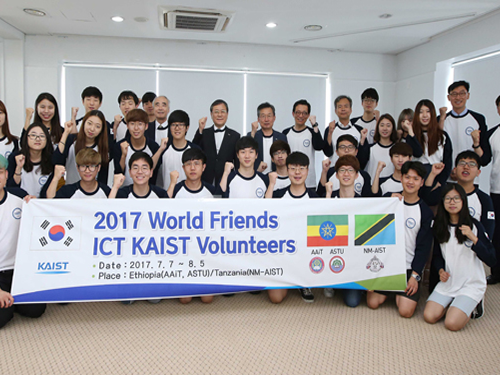 2017 World Friends ICT KAIST Sets Off to Ethiopia, Tanzania
KAIST launched the ‘2017 World Friends ICT KAIST’ on 21 June at a ceremony held at the Faculty Club. The event was attended by 40 student volunteers and faculty members including President Sung-Chul Shin and student volunteers.
The ‘2017 World Friends ICT KAIST’ is an oversees volunteer program aimed at providing ICT education for students from developing countries and for cultural exchange. The program was organized by the KAIST Leadership Center and sponsored by the National Information Agency (NIA) since 2015.
President Sung-Chul Shin delivered words of encouragement to start the opening ceremony, followed by an oath-taking by the volunteer group, safety training, and a commemorative photoshoot. This year’s World Friends ICT volunteer group consisted of 32 students and 2 staff members to lead and to support the team.
The group was divided into eight teams including APP-frica, KAI-Tigers, and WITH (4 members per team) to volunteer in Addis Ababa Institute of Technology (AAIT) and Adama Science and Technology University in Ethiopia (ASTU), as well as Nelson Mandela African Institute of Science and Technology (NM-AIST) in Tanzania. The teams will educate local students on ICT and promote cultural exchanges. The volunteer period is from July 7 to August 5, lasting about a month.
KAIST conducted primary document examinations and interviews from April 27 to May 18 on volunteer candidates who registered to take part, and selected 32 student volunteers. A total of 68 students registered to volunteer, resulting in a 1:2.1 competition rate.
The volunteering program was customized to the local needs of Ethiopia and Tanzania and thus consisted of ICT education, cultural exchanges, volunteering at farms on the weekends, and science experiments. The area with the most focus by the volunteer team is ICT education, which accounts for 70% of the total volunteer activities. The aim is to educate Ethiopian students at AAIT and ASTU on Windows, MS Office, Adobe Photoshop, and using smartphones. In Tanzania, the team is to volunteer with students of NM-AIST to provide ICT application education such as water tank control using appropriate technology and Arduino to local high school students.
The team is also planning to promote cultural exchanges by preparing K-Pop dancing, traditional Korean games such as Korean shuttlecock game (jegichagi) and Korean wrestling (ssireum), traditional cooking such as bibimbab and half-moon-shaped rice cake (songpyeon), and teaching the Korean language, as well as preparing cultural performances with local university students. On the weekends, the team will visit local farms to volunteer, and local elementary schools and orphanages to conduct science experiments for children, as well as physical education and art activities.
(Photo caption: Volunteers poses with faculty and staff members including President Sung-Chul Shin at a ceremony on June 21.)
2017.06.29 View 11300
2017 World Friends ICT KAIST Sets Off to Ethiopia, Tanzania
KAIST launched the ‘2017 World Friends ICT KAIST’ on 21 June at a ceremony held at the Faculty Club. The event was attended by 40 student volunteers and faculty members including President Sung-Chul Shin and student volunteers.
The ‘2017 World Friends ICT KAIST’ is an oversees volunteer program aimed at providing ICT education for students from developing countries and for cultural exchange. The program was organized by the KAIST Leadership Center and sponsored by the National Information Agency (NIA) since 2015.
President Sung-Chul Shin delivered words of encouragement to start the opening ceremony, followed by an oath-taking by the volunteer group, safety training, and a commemorative photoshoot. This year’s World Friends ICT volunteer group consisted of 32 students and 2 staff members to lead and to support the team.
The group was divided into eight teams including APP-frica, KAI-Tigers, and WITH (4 members per team) to volunteer in Addis Ababa Institute of Technology (AAIT) and Adama Science and Technology University in Ethiopia (ASTU), as well as Nelson Mandela African Institute of Science and Technology (NM-AIST) in Tanzania. The teams will educate local students on ICT and promote cultural exchanges. The volunteer period is from July 7 to August 5, lasting about a month.
KAIST conducted primary document examinations and interviews from April 27 to May 18 on volunteer candidates who registered to take part, and selected 32 student volunteers. A total of 68 students registered to volunteer, resulting in a 1:2.1 competition rate.
The volunteering program was customized to the local needs of Ethiopia and Tanzania and thus consisted of ICT education, cultural exchanges, volunteering at farms on the weekends, and science experiments. The area with the most focus by the volunteer team is ICT education, which accounts for 70% of the total volunteer activities. The aim is to educate Ethiopian students at AAIT and ASTU on Windows, MS Office, Adobe Photoshop, and using smartphones. In Tanzania, the team is to volunteer with students of NM-AIST to provide ICT application education such as water tank control using appropriate technology and Arduino to local high school students.
The team is also planning to promote cultural exchanges by preparing K-Pop dancing, traditional Korean games such as Korean shuttlecock game (jegichagi) and Korean wrestling (ssireum), traditional cooking such as bibimbab and half-moon-shaped rice cake (songpyeon), and teaching the Korean language, as well as preparing cultural performances with local university students. On the weekends, the team will visit local farms to volunteer, and local elementary schools and orphanages to conduct science experiments for children, as well as physical education and art activities.
(Photo caption: Volunteers poses with faculty and staff members including President Sung-Chul Shin at a ceremony on June 21.)
2017.06.29 View 11300 -
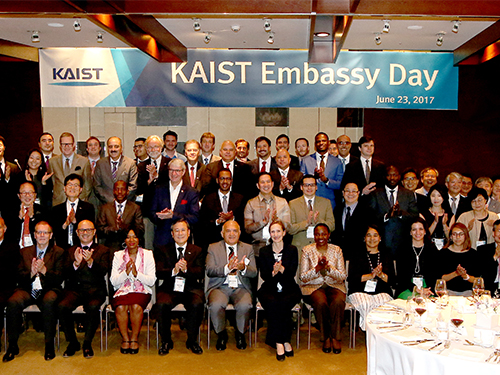 The Embassy Day Builds the Global Presence of KAIST
(Photo caption: Diplomats and KAIST faculty pose at the Embassy Day KAIST hosted on June 23.)
KAIST is stepping up its initiative for building global competitiveness. The Embassy Day hosted on June 23 will be a stepping stone to diversify its channels for promoting the global presence of KAIST. KAIST invited the foreign diplomatic corps from Seoul to share their successful journey to emerge as the world-class university. The event featured KAIST’s research highlights, academic experiences, and global environment through presentations by faculty and students.
KAIST President Sung-Chul Shin said in his welcoming speech that he hopes for brains from around the world to come to KAIST and believes this event will serve as an opportunity to spread the global reputation of KAIST more widely. President Shin, who took office in March, ambitiously hosted this event for the first time, saying, “We didn’t expect this big of a response from the diplomats. The presence of this leading group of diplomats reflects how KAIST’s reputation has blossomed.”
Nearly 100 diplomats from 65 countries attended the event held at the Grand Hyatt Seoul. Among the participants were ambassadors from 33 countries including Australian Amb. James Choi, Canadian Amb. Eric Walsh, and German Amb. Stephan Auer, reflecting the growing interest in the advancements in science and technology education and innovation in KAIST.
The entire leadership team of KAIST turned out for the event including Provost O-Ok Park, Associate Vice President of the International Office Jay Hyung Lee, and Dean of Admissions Hayong Shin to provide an update on KAIST activities as well as admission policies, and make a new network with the foreign envoys.
At the event, KAIST presented some of its latest research highlights that are gaining international acclaim. Professor Jun-ho Oh, director at the Humanoid Robot Research Center talked on the short history of the development of the KAIST humanoid robot, HUBO, which won the DARPA Robotics Challenge (DRC) in 2015. Distinguished Professor Sang-Yup Lee, dean of the KAIST Institute, which is the center of multidisciplinary research projects in KAIST, made a presentation on advances in metabolic engineering. In addition, Professor David Helfman of the Department of Biological Science shared his research on breast cancer and metastasis.
Foreign students and faculty shared their experiences on becoming part of the KAIST community during the testimonial session. In particular, the story of Professor Jean-Charles Bazin of the Graduate School of Culture Technology was quite moving. Originally from France, Professor Bazin talked about his unique career path, starting as an exchange student at KAIST before settling down as a faculty member here. He cited the high caliber group of faculty as one of the reasons he completed his Ph.D. at KAIST. “Most of the faculty members are from top institutions in the US, Europe, and around the world, so they have very resourceful contacts with distinguished researchers and scholars abroad. That helped me make up my mind to choose KAIST,” he said.
Currently, 179 foreign faculty and researchers from over 31 countries, representing 8.7% of the total faculty, are working at KAIST. Also, 710 foreign students from 86 countries, representing about 8% of the total students, are now studying at KAIST.
President Shin continued, “In this complex global era, brains follow the best path to where they can reach their potential. KAIST is now gaining tremendous strength by becoming a magnet for talents from around the world. We would like to recruit these brains to create new knowledge with a global impact. Then we will become true global university with supremacy in research and education.
President Shin said KAIST is gearing up for another round of innovation initiatives in education, convergence research, technology commercialization, future strategies, and globalization. He emphasized that globalization of the campus is a must for building up our global competitiveness.
(Photo caption from the top: President Shin greets participant. Professor Oh explains the functions of the HUBO. Professor Helfman presents on his research of breast cancer and metastasis. KAIST a capella group showcases singing skills at the event. Participants meet and greet at the Embassy Day.)
2017.06.23 View 10032
The Embassy Day Builds the Global Presence of KAIST
(Photo caption: Diplomats and KAIST faculty pose at the Embassy Day KAIST hosted on June 23.)
KAIST is stepping up its initiative for building global competitiveness. The Embassy Day hosted on June 23 will be a stepping stone to diversify its channels for promoting the global presence of KAIST. KAIST invited the foreign diplomatic corps from Seoul to share their successful journey to emerge as the world-class university. The event featured KAIST’s research highlights, academic experiences, and global environment through presentations by faculty and students.
KAIST President Sung-Chul Shin said in his welcoming speech that he hopes for brains from around the world to come to KAIST and believes this event will serve as an opportunity to spread the global reputation of KAIST more widely. President Shin, who took office in March, ambitiously hosted this event for the first time, saying, “We didn’t expect this big of a response from the diplomats. The presence of this leading group of diplomats reflects how KAIST’s reputation has blossomed.”
Nearly 100 diplomats from 65 countries attended the event held at the Grand Hyatt Seoul. Among the participants were ambassadors from 33 countries including Australian Amb. James Choi, Canadian Amb. Eric Walsh, and German Amb. Stephan Auer, reflecting the growing interest in the advancements in science and technology education and innovation in KAIST.
The entire leadership team of KAIST turned out for the event including Provost O-Ok Park, Associate Vice President of the International Office Jay Hyung Lee, and Dean of Admissions Hayong Shin to provide an update on KAIST activities as well as admission policies, and make a new network with the foreign envoys.
At the event, KAIST presented some of its latest research highlights that are gaining international acclaim. Professor Jun-ho Oh, director at the Humanoid Robot Research Center talked on the short history of the development of the KAIST humanoid robot, HUBO, which won the DARPA Robotics Challenge (DRC) in 2015. Distinguished Professor Sang-Yup Lee, dean of the KAIST Institute, which is the center of multidisciplinary research projects in KAIST, made a presentation on advances in metabolic engineering. In addition, Professor David Helfman of the Department of Biological Science shared his research on breast cancer and metastasis.
Foreign students and faculty shared their experiences on becoming part of the KAIST community during the testimonial session. In particular, the story of Professor Jean-Charles Bazin of the Graduate School of Culture Technology was quite moving. Originally from France, Professor Bazin talked about his unique career path, starting as an exchange student at KAIST before settling down as a faculty member here. He cited the high caliber group of faculty as one of the reasons he completed his Ph.D. at KAIST. “Most of the faculty members are from top institutions in the US, Europe, and around the world, so they have very resourceful contacts with distinguished researchers and scholars abroad. That helped me make up my mind to choose KAIST,” he said.
Currently, 179 foreign faculty and researchers from over 31 countries, representing 8.7% of the total faculty, are working at KAIST. Also, 710 foreign students from 86 countries, representing about 8% of the total students, are now studying at KAIST.
President Shin continued, “In this complex global era, brains follow the best path to where they can reach their potential. KAIST is now gaining tremendous strength by becoming a magnet for talents from around the world. We would like to recruit these brains to create new knowledge with a global impact. Then we will become true global university with supremacy in research and education.
President Shin said KAIST is gearing up for another round of innovation initiatives in education, convergence research, technology commercialization, future strategies, and globalization. He emphasized that globalization of the campus is a must for building up our global competitiveness.
(Photo caption from the top: President Shin greets participant. Professor Oh explains the functions of the HUBO. Professor Helfman presents on his research of breast cancer and metastasis. KAIST a capella group showcases singing skills at the event. Participants meet and greet at the Embassy Day.)
2017.06.23 View 10032 -
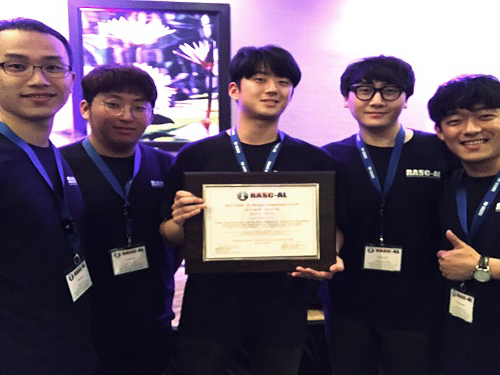 Winning Best in Theme Award in NASA RASC-AL
A students team from the Department of Aerospace Engineering won the Best in Theme Award for moon exploration system design at Revolutionary Aerospace Systems Concepts - Academic Linkage (RASC-AL), an aerospace mission system design competition organized by NASA in the USA.
The KAIST team, consisting of Jaeyoul Ko, Jongeun Suh, Juseong Lee, Sukmin Choi, and Eunkwang Lee, and supervised by Professor Jaemyung Ahn, competed as a joint team with Texas Tech University and the Royal Melbourne Institute of Technology in Australia,
The joint team was selected as one of the 14 finalists after two preliminary rounds. The finals of RASC-AL Forum took place from May 30 to June 3 in Florida. The team received the top prize with their design entitled ‘Earth to Lunar Interchangeable Transportation Environment (ELITE) for Logistics Delivery Systems’, one of the four themes of the competition.
Since 2002, RASC-AL competitions, managed by NASA, have been held with themes on innovative aerospace system and missions, in which world-class undergraduate and graduate students have participated.
This year’s themes were ▲ Lightweight Exercise Suite ▲ Airlock Design ▲ Commercially Enabled LEO/Mars Habitable Module and ▲ Logistics Delivery System.
Moon exploration requires a great deal of time and supplies. The KAIST team has been researching supply delivery systems in space for long-term manned moon exploration with their joint team for the last eight months. In particular, incidents can occur during the initial stages of long-term manned moon exploration missions that are unpredictable during system design and planning. Therefore, to cope with such unpredictability in the mission, the KAIST team deduced a system and an operational concept with increased flexibility to maximize the cost effectiveness of the supply transport.
The spacecraft was divided into propulsion and transport modules based on their functionalities, and can allow the flexibility by switching the transport module according to the demands of the moon base. The operational flexibility and cost effectiveness are further increased by introducing multiple departure orbits from the Earth (e.g. low Earth orbit vs. geosynchronous Earth orbit) enabled by utilization of various launch vehicles.
Professor Ahn, the advisor for the team, said, “I am proud of the students who collaborated with the international joint teams and achieved great result.” He continued, “I believe this to be the result of continuous efforts and initiatives of the department for system design-centered education. We will keep providing high-quality system design and education through various opportunities such as international cooperation in design education.”
(Photo caption: KAIST team of the Department of Aerospace Engineering poses after winning the Best in Theme Award in NASA's RASC-AL)
2017.06.22 View 9002
Winning Best in Theme Award in NASA RASC-AL
A students team from the Department of Aerospace Engineering won the Best in Theme Award for moon exploration system design at Revolutionary Aerospace Systems Concepts - Academic Linkage (RASC-AL), an aerospace mission system design competition organized by NASA in the USA.
The KAIST team, consisting of Jaeyoul Ko, Jongeun Suh, Juseong Lee, Sukmin Choi, and Eunkwang Lee, and supervised by Professor Jaemyung Ahn, competed as a joint team with Texas Tech University and the Royal Melbourne Institute of Technology in Australia,
The joint team was selected as one of the 14 finalists after two preliminary rounds. The finals of RASC-AL Forum took place from May 30 to June 3 in Florida. The team received the top prize with their design entitled ‘Earth to Lunar Interchangeable Transportation Environment (ELITE) for Logistics Delivery Systems’, one of the four themes of the competition.
Since 2002, RASC-AL competitions, managed by NASA, have been held with themes on innovative aerospace system and missions, in which world-class undergraduate and graduate students have participated.
This year’s themes were ▲ Lightweight Exercise Suite ▲ Airlock Design ▲ Commercially Enabled LEO/Mars Habitable Module and ▲ Logistics Delivery System.
Moon exploration requires a great deal of time and supplies. The KAIST team has been researching supply delivery systems in space for long-term manned moon exploration with their joint team for the last eight months. In particular, incidents can occur during the initial stages of long-term manned moon exploration missions that are unpredictable during system design and planning. Therefore, to cope with such unpredictability in the mission, the KAIST team deduced a system and an operational concept with increased flexibility to maximize the cost effectiveness of the supply transport.
The spacecraft was divided into propulsion and transport modules based on their functionalities, and can allow the flexibility by switching the transport module according to the demands of the moon base. The operational flexibility and cost effectiveness are further increased by introducing multiple departure orbits from the Earth (e.g. low Earth orbit vs. geosynchronous Earth orbit) enabled by utilization of various launch vehicles.
Professor Ahn, the advisor for the team, said, “I am proud of the students who collaborated with the international joint teams and achieved great result.” He continued, “I believe this to be the result of continuous efforts and initiatives of the department for system design-centered education. We will keep providing high-quality system design and education through various opportunities such as international cooperation in design education.”
(Photo caption: KAIST team of the Department of Aerospace Engineering poses after winning the Best in Theme Award in NASA's RASC-AL)
2017.06.22 View 9002 -
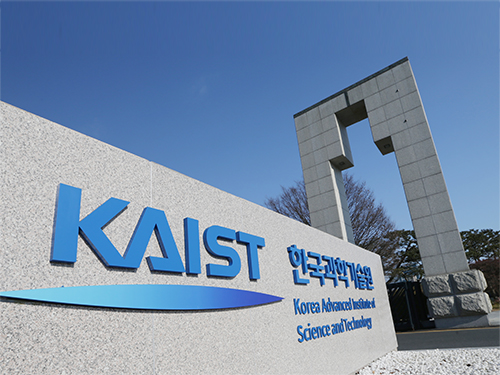 KAIST to Participate in the Summer Davos Forum
KAIST will participate in the 2017 Summer Davos Forum in Dalian, China from June 27 to 29. The Summer Davos Forum with the official title “Annual Meeting of New Champions” is an annual international meeting co-hosted by China and the World Economic Forum (WEF) to address global issues which has been held since 2007.
Focusing on this year’s theme ‘Achieving Inclusive Growth in the Fourth Industrial Revolution,’ science and technology experts from 90 different countries will participate in various sessions to present on and discuss pending global innovative issues. KAIST is to be the only Korean university to run ‘IdeasLab,’ in which researchers will introduce current research trends and discuss ideas with global leaders. This is the sixth year for KAIST to run IdeasLab.
This year’s IdeasLab has the theme ‘Materials of the Future,’ and will include presentations and discussions on materials developed at KAIST which could lead the Fourth Industrial Revolution. President Sung-Chul Shin, the chairman of the session, will first introduce the current status of KAIST and IdeasLab, followed by a presentation of cutting-edge integrated research findings by KAIST professors.
President Shin will also participate in various sessions organized by the Global University Leaders Forum (GULF) as discussion leader. President Shin is the only Korean member of GULF, a community comprised of the presidents of the world’s top 27 universities. Other members include the presidents of the University of Oxford and the University of Cambridge in the U.K., MIT, Harvard, Stanford, and Columbia Universities in the US, and the University of Tokyo in Japan.
Further, President Shin will participate in a strategy session for inclusive growth in the era of the Fourth Industrial Revolution and a meeting with the WEF directors.
The Dean of KAIST Institutes, Distinguished Professor Sang Yup Lee from the Chemical and Biomolecular Engineering Department, who has been invited to the Davos Forum and Summer Davos Forum for the last 15 years, is to present in the ‘Future of Life: Medicine’ session to introduce advancements in traditional medicine through systems biology such as his research on microbiomes (gut microbes).
Professor Lee, as the chair of the Global Future Council on Biotechnology at the WEF, and committee member of the Annual Meeting of the Global Future Councils on the Fourth Industrial Revolution, is to participate in various bio-sessions and the Fourth Industrial Revolution banquet session to lead the discussions.
President Shin said, “KAIST has been sharing global research findings with global leaders through IdeasLab at the Davos Forum for the past six years and it has always been well received.” He continued, “The forum will be the place for in-depth discussion on the technological changes that accompany the Fourth Industrial Revolution and human-centered development plan, as well as introducing innovative research and integrated research findings from KAIST.”
This year’s speakers include Li Keqiang, the current Premier of the State Council of China; Guo Ping, the rotating C.E.O. of Huawei; and Ya-Qin Zhang, the President of Baidu, a company leading technological innovation in various fields such as robotics and autonomous vehicles. Two thousand distinguished guests in politics, administration, finance, and academia from 90 countries are to participate in the meeting.
2017.06.21 View 9085
KAIST to Participate in the Summer Davos Forum
KAIST will participate in the 2017 Summer Davos Forum in Dalian, China from June 27 to 29. The Summer Davos Forum with the official title “Annual Meeting of New Champions” is an annual international meeting co-hosted by China and the World Economic Forum (WEF) to address global issues which has been held since 2007.
Focusing on this year’s theme ‘Achieving Inclusive Growth in the Fourth Industrial Revolution,’ science and technology experts from 90 different countries will participate in various sessions to present on and discuss pending global innovative issues. KAIST is to be the only Korean university to run ‘IdeasLab,’ in which researchers will introduce current research trends and discuss ideas with global leaders. This is the sixth year for KAIST to run IdeasLab.
This year’s IdeasLab has the theme ‘Materials of the Future,’ and will include presentations and discussions on materials developed at KAIST which could lead the Fourth Industrial Revolution. President Sung-Chul Shin, the chairman of the session, will first introduce the current status of KAIST and IdeasLab, followed by a presentation of cutting-edge integrated research findings by KAIST professors.
President Shin will also participate in various sessions organized by the Global University Leaders Forum (GULF) as discussion leader. President Shin is the only Korean member of GULF, a community comprised of the presidents of the world’s top 27 universities. Other members include the presidents of the University of Oxford and the University of Cambridge in the U.K., MIT, Harvard, Stanford, and Columbia Universities in the US, and the University of Tokyo in Japan.
Further, President Shin will participate in a strategy session for inclusive growth in the era of the Fourth Industrial Revolution and a meeting with the WEF directors.
The Dean of KAIST Institutes, Distinguished Professor Sang Yup Lee from the Chemical and Biomolecular Engineering Department, who has been invited to the Davos Forum and Summer Davos Forum for the last 15 years, is to present in the ‘Future of Life: Medicine’ session to introduce advancements in traditional medicine through systems biology such as his research on microbiomes (gut microbes).
Professor Lee, as the chair of the Global Future Council on Biotechnology at the WEF, and committee member of the Annual Meeting of the Global Future Councils on the Fourth Industrial Revolution, is to participate in various bio-sessions and the Fourth Industrial Revolution banquet session to lead the discussions.
President Shin said, “KAIST has been sharing global research findings with global leaders through IdeasLab at the Davos Forum for the past six years and it has always been well received.” He continued, “The forum will be the place for in-depth discussion on the technological changes that accompany the Fourth Industrial Revolution and human-centered development plan, as well as introducing innovative research and integrated research findings from KAIST.”
This year’s speakers include Li Keqiang, the current Premier of the State Council of China; Guo Ping, the rotating C.E.O. of Huawei; and Ya-Qin Zhang, the President of Baidu, a company leading technological innovation in various fields such as robotics and autonomous vehicles. Two thousand distinguished guests in politics, administration, finance, and academia from 90 countries are to participate in the meeting.
2017.06.21 View 9085 -
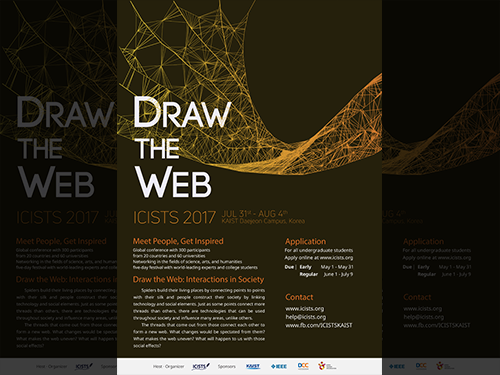 2017 ICISTS Conference 'Draw the Web: Interactions in Society'
The KAIST undergraduate organization, ICISTS (International Conference for Integration of Science, Technology and Society) will convene its annual conference from July 31 to Aug. 4 at the KAIST Daejeon Campus. This year’s theme is “Draw the Web: Interactions in Society.” More than 300 participants from 60 universities in 20 countries will participate in the international conference hosted and planned by the student organization.
Speakers at the 2017 conference include leaders in technology, business, investment, and entrepreneurship, and many others highlighted by Christoffer O. Hernæs, chief digital officer of Skandiabanken and vice president of strategy and innovation at Sparebank; Vincent C. Müller, professor of the philosophy division of humanities & social sciences at Anatolia College; Nigel Parker, director of developer and platform evangelism at Microsoft APAC; and Jon Gosier, founder and CEO of WoundedMetrics, who was voted as one of the 25 most influential African-Americans in technology by Business Insider in 2013 and 2014.
ICISTS has organized and hosted this event, the largest academic conference hosted and organized by students in Asia, since 2005 as a way to discuss an incredibly challenging issue: how science and technology is being integrated into society. This year’s conference will explore how prominent technological advancements are integrated, and how the interactions between humanity and technology will affect society. This year’s sub-theme is “Settlement, Movement, and Inequality.”
In addition to the main session, ICISTS is preparing discussion sessions in which guest speakers and participants will divide into small groups to discuss their responses to the themes. Various additional events including a culture night and an excursion program will serve as opportunities to network with other participants. For more information on the program and how to register, please visit http://www.icist.org.
2017.05.22 View 8359
2017 ICISTS Conference 'Draw the Web: Interactions in Society'
The KAIST undergraduate organization, ICISTS (International Conference for Integration of Science, Technology and Society) will convene its annual conference from July 31 to Aug. 4 at the KAIST Daejeon Campus. This year’s theme is “Draw the Web: Interactions in Society.” More than 300 participants from 60 universities in 20 countries will participate in the international conference hosted and planned by the student organization.
Speakers at the 2017 conference include leaders in technology, business, investment, and entrepreneurship, and many others highlighted by Christoffer O. Hernæs, chief digital officer of Skandiabanken and vice president of strategy and innovation at Sparebank; Vincent C. Müller, professor of the philosophy division of humanities & social sciences at Anatolia College; Nigel Parker, director of developer and platform evangelism at Microsoft APAC; and Jon Gosier, founder and CEO of WoundedMetrics, who was voted as one of the 25 most influential African-Americans in technology by Business Insider in 2013 and 2014.
ICISTS has organized and hosted this event, the largest academic conference hosted and organized by students in Asia, since 2005 as a way to discuss an incredibly challenging issue: how science and technology is being integrated into society. This year’s conference will explore how prominent technological advancements are integrated, and how the interactions between humanity and technology will affect society. This year’s sub-theme is “Settlement, Movement, and Inequality.”
In addition to the main session, ICISTS is preparing discussion sessions in which guest speakers and participants will divide into small groups to discuss their responses to the themes. Various additional events including a culture night and an excursion program will serve as opportunities to network with other participants. For more information on the program and how to register, please visit http://www.icist.org.
2017.05.22 View 8359 -
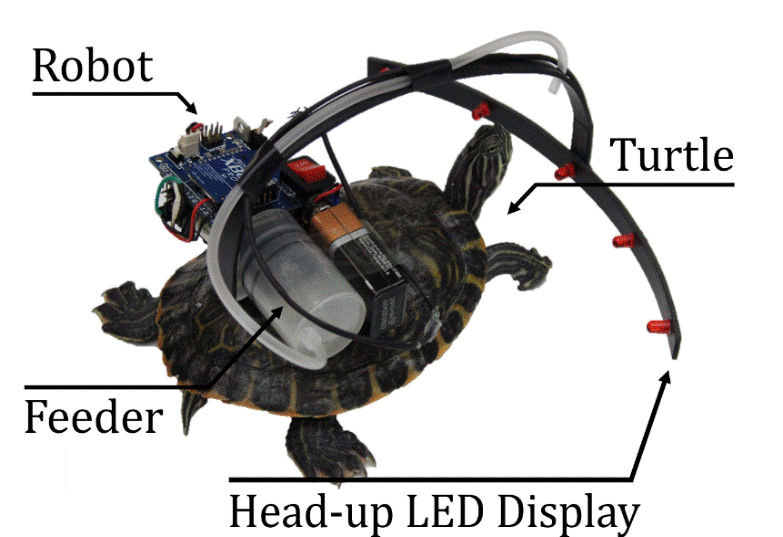 Parasitic Robot System for Turtle's Waypoint Navigation
A KAIST research team presented a hybrid animal-robot interaction called “the parasitic robot system,” that imitates the nature relationship between parasites and host.
The research team led by Professor Phil-Seung Lee of the Department of Mechanical Engineering took an animal’s locomotive abilities to apply the theory of using a robot as a parasite. The robot is attached to its host animal in a way similar to an actual parasite, and it interacts with the host through particular devices and algorithms.
Even with remarkable technology advancements, robots that operate in complex and harsh environments still have some serious limitations in moving and recharging. However, millions of years of evolution have led to there being many real animals capable of excellent locomotion and survive in actual natural environment.
Certain kinds of real parasites can manipulate the behavior of the host to increase the probability of its own reproduction. Similarly, in the proposed concept of a “parasitic robot,” a specific behavior is induced by the parasitic robot in its host to benefit the robot.
The team chose a turtle as their first host animal and designed a parasitic robot that can perform “stimulus-response training.” The parasitic robot, which is attached to the turtle, can induce the turtle’s object-tracking behavior through repeated training sessions.
The robot then simply guides it using LEDs and feeds it snacks as a reward for going in the right direction through a programmed algorithm. After training sessions lasting five weeks, the parasitic robot can successfully control the direction of movement of the host turtles in the waypoint navigation task in a water tank.
This hybrid animal–robot interaction system could provide an alternative solution of the limitations of conventional mobile robot systems in various fields. Ph.D. candidate Dae-Gun Kim, the first author of this research said that there are a wide variety of animals including mice, birds, and fish that could perform equally as well at such tasks. He said that in the future, this system will be applied to various exploration and reconnaissance missions that humans and robots find it difficult to do on their own.
Kim said, “This hybrid animal-robot interaction system could provide an alternative solution to the limitations of conventional mobile robot systems in various fields, and could also act as a useful interaction system for the behavioral sciences.”
The research was published in the Journal of Bionic Engineering April issue.
2017.05.19 View 10102
Parasitic Robot System for Turtle's Waypoint Navigation
A KAIST research team presented a hybrid animal-robot interaction called “the parasitic robot system,” that imitates the nature relationship between parasites and host.
The research team led by Professor Phil-Seung Lee of the Department of Mechanical Engineering took an animal’s locomotive abilities to apply the theory of using a robot as a parasite. The robot is attached to its host animal in a way similar to an actual parasite, and it interacts with the host through particular devices and algorithms.
Even with remarkable technology advancements, robots that operate in complex and harsh environments still have some serious limitations in moving and recharging. However, millions of years of evolution have led to there being many real animals capable of excellent locomotion and survive in actual natural environment.
Certain kinds of real parasites can manipulate the behavior of the host to increase the probability of its own reproduction. Similarly, in the proposed concept of a “parasitic robot,” a specific behavior is induced by the parasitic robot in its host to benefit the robot.
The team chose a turtle as their first host animal and designed a parasitic robot that can perform “stimulus-response training.” The parasitic robot, which is attached to the turtle, can induce the turtle’s object-tracking behavior through repeated training sessions.
The robot then simply guides it using LEDs and feeds it snacks as a reward for going in the right direction through a programmed algorithm. After training sessions lasting five weeks, the parasitic robot can successfully control the direction of movement of the host turtles in the waypoint navigation task in a water tank.
This hybrid animal–robot interaction system could provide an alternative solution of the limitations of conventional mobile robot systems in various fields. Ph.D. candidate Dae-Gun Kim, the first author of this research said that there are a wide variety of animals including mice, birds, and fish that could perform equally as well at such tasks. He said that in the future, this system will be applied to various exploration and reconnaissance missions that humans and robots find it difficult to do on their own.
Kim said, “This hybrid animal-robot interaction system could provide an alternative solution to the limitations of conventional mobile robot systems in various fields, and could also act as a useful interaction system for the behavioral sciences.”
The research was published in the Journal of Bionic Engineering April issue.
2017.05.19 View 10102 -
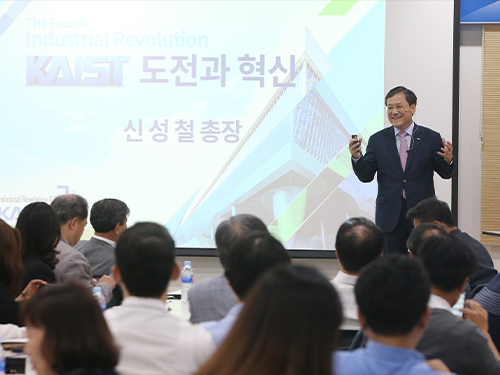 Policy Debate Series for Industry 4.0
(Photo caption: President Shin takes the podium as the first speaker of a year-long monthly policy dabate series on Industry 4.0 on May 11.)
KAIST will kick off a monthly policy debate series on Industry 4.0 every Thursday from May 11 at the Startup KAIST building. The year-long series, featuring professors from key technology fields associated with Industry 4.0, is designed to help policy makers from government, industry, and research institutes respond better to the ramifications that Industry 4.0 brings about in each sector.
The series will help them establish the vision and strategy that will work for the new industrial environment to take the lead in the new industrial era.
Twelve professors, including President Sung-Chul Shin, from departments that are researching emerging technologies will speak on the megatrend of new technology, while facilitating debates and Q& A sessions with participants.
The participants will include officials from the government complexes in Sejong and Daejeon cities, government-funded research institutes in Daejeon, and businessmen, among others. For registration, please go to https://startup.kaist.ac.kr/register.
Schedule
Speaker
Theme
May 11
President Sung-Chul Shin
Challenges and Innovations of KAIST in the Era of Industry 4.0
June 8
Professor Jonghwan Kim
Machine Intelligence and Deep Learning
July 6
Professor Jun Ho Oh
Robot Technology and the Future
Aug. 3
Professor Hyunchul Shim
Unmanned Vehicle Technology and Industry 4.0
Sept. 7
Professor Hawoong Jeong
Complex Systems and Data Science
Oct. 12
Professor Yongdae Kim
Technology, Policy, and the Fostering of Talents: Industry 4.0 and Information Protection
Nov. 9
Professor Sang Yup Lee
The Role of Biotechnology in Industry 4.0
Dec. 7
Professor Meeyoung Cha
AI-Based Research for Fake News Detection
2018 Jan. 4
Professor Joungho Kim
Innovation for the Korean Semiconductor Industry: Kim’s Law
Feb. 8
Professor Jaekyun Moon
Education for Industry 4.0
March 8
Professor Sang Kil Cha
Artificial Intelligence Cyber Warfare: Its Present and Future
April 5
Professor Jaeseung Jeong
The Future of Brain Engineering and Artificial Intelligence
2017.05.08 View 10416
Policy Debate Series for Industry 4.0
(Photo caption: President Shin takes the podium as the first speaker of a year-long monthly policy dabate series on Industry 4.0 on May 11.)
KAIST will kick off a monthly policy debate series on Industry 4.0 every Thursday from May 11 at the Startup KAIST building. The year-long series, featuring professors from key technology fields associated with Industry 4.0, is designed to help policy makers from government, industry, and research institutes respond better to the ramifications that Industry 4.0 brings about in each sector.
The series will help them establish the vision and strategy that will work for the new industrial environment to take the lead in the new industrial era.
Twelve professors, including President Sung-Chul Shin, from departments that are researching emerging technologies will speak on the megatrend of new technology, while facilitating debates and Q& A sessions with participants.
The participants will include officials from the government complexes in Sejong and Daejeon cities, government-funded research institutes in Daejeon, and businessmen, among others. For registration, please go to https://startup.kaist.ac.kr/register.
Schedule
Speaker
Theme
May 11
President Sung-Chul Shin
Challenges and Innovations of KAIST in the Era of Industry 4.0
June 8
Professor Jonghwan Kim
Machine Intelligence and Deep Learning
July 6
Professor Jun Ho Oh
Robot Technology and the Future
Aug. 3
Professor Hyunchul Shim
Unmanned Vehicle Technology and Industry 4.0
Sept. 7
Professor Hawoong Jeong
Complex Systems and Data Science
Oct. 12
Professor Yongdae Kim
Technology, Policy, and the Fostering of Talents: Industry 4.0 and Information Protection
Nov. 9
Professor Sang Yup Lee
The Role of Biotechnology in Industry 4.0
Dec. 7
Professor Meeyoung Cha
AI-Based Research for Fake News Detection
2018 Jan. 4
Professor Joungho Kim
Innovation for the Korean Semiconductor Industry: Kim’s Law
Feb. 8
Professor Jaekyun Moon
Education for Industry 4.0
March 8
Professor Sang Kil Cha
Artificial Intelligence Cyber Warfare: Its Present and Future
April 5
Professor Jaeseung Jeong
The Future of Brain Engineering and Artificial Intelligence
2017.05.08 View 10416 -
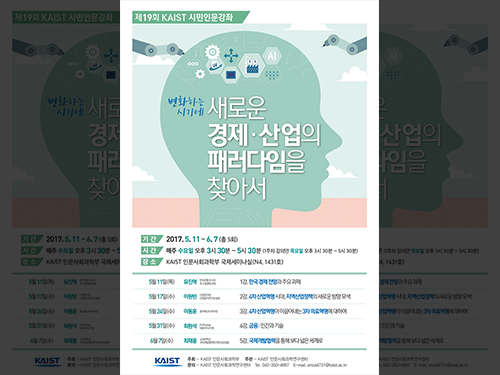 Seeking a New Economic and Industrial Paradigm
The School of Humanities & Social Science will offer the open lecture course titled ‘Seeking a New Economic and Industrial Paradigm’ from May11 to June 7. This is part of a quarterly lecture series run by the school and open to the public.
The open lecture is designed to provide opportunities for the public to identify future challenges and opportunities for Korea’s economy and industry. Experts in macroeconomics, finance, and global collaboration will provide glimpses of new directions for each sector as well as megatrends of emerging technologies on the heels of the 4th Industrial Revolution.
Jin Hyuk Yoo from the Bank of Korea will speak on the ‘Outlook and Challenges of the Korean Economy.’ He will identify the current economic situation and explain how to build on sustainable long-term economic growth in the opening course.
Won-Bin Lee of the Korea Institute for Industrial Economics & Trade will present on the ‘New Industrial Policy in the Era of the Fourth Industrial Revolution.’ His lecture will focus on fostering the local industry and creating its own ecosystem for furthering regional industries.
Dong-Hoon Lee of Donga ST will speak on the implications that the Fourth Industrial Revolution will bring about in the medical industry. Won-Suk Choi of FnPricing will introduce the FN business model, presenting the risks and benefits of fintech in his lecture ‘Finance: Human and Technology.’
Jae-Hong Choi of the Institute of International Development Cooperation at Korea University will give a talk titled ‘Toward the World through Global Cooperation.’ He will present on the history of Korea’s global cooperation initiatives and the role of KOICA, introducing its emerging economic and industrial cooperation model.
Professor Jeounghoon Kim, who is responsible for the public lecture program, said, “Korea now faces very diverse social economic and industrial challenges and we seem to be lost while searching for a solution. The public will have an opportunity to understand the current economic situation and its industrial implications.”
For registration and more info, please visit http://hss.kaist.ac.kr.
2017.04.26 View 8386
Seeking a New Economic and Industrial Paradigm
The School of Humanities & Social Science will offer the open lecture course titled ‘Seeking a New Economic and Industrial Paradigm’ from May11 to June 7. This is part of a quarterly lecture series run by the school and open to the public.
The open lecture is designed to provide opportunities for the public to identify future challenges and opportunities for Korea’s economy and industry. Experts in macroeconomics, finance, and global collaboration will provide glimpses of new directions for each sector as well as megatrends of emerging technologies on the heels of the 4th Industrial Revolution.
Jin Hyuk Yoo from the Bank of Korea will speak on the ‘Outlook and Challenges of the Korean Economy.’ He will identify the current economic situation and explain how to build on sustainable long-term economic growth in the opening course.
Won-Bin Lee of the Korea Institute for Industrial Economics & Trade will present on the ‘New Industrial Policy in the Era of the Fourth Industrial Revolution.’ His lecture will focus on fostering the local industry and creating its own ecosystem for furthering regional industries.
Dong-Hoon Lee of Donga ST will speak on the implications that the Fourth Industrial Revolution will bring about in the medical industry. Won-Suk Choi of FnPricing will introduce the FN business model, presenting the risks and benefits of fintech in his lecture ‘Finance: Human and Technology.’
Jae-Hong Choi of the Institute of International Development Cooperation at Korea University will give a talk titled ‘Toward the World through Global Cooperation.’ He will present on the history of Korea’s global cooperation initiatives and the role of KOICA, introducing its emerging economic and industrial cooperation model.
Professor Jeounghoon Kim, who is responsible for the public lecture program, said, “Korea now faces very diverse social economic and industrial challenges and we seem to be lost while searching for a solution. The public will have an opportunity to understand the current economic situation and its industrial implications.”
For registration and more info, please visit http://hss.kaist.ac.kr.
2017.04.26 View 8386 -
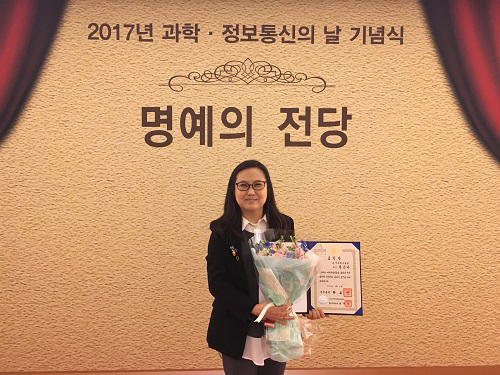 Professor Jinah Park Received the Prime Minister's Award
Professor Jinah Park of the School of Computing received the Prime Minister’s Citation Ribbon on April 21 at a ceremony celebrating the Day of Science and ICT. The awardee was selected by the Ministry of Science, ICT and Future Planning and Korea Communications Commission.
Professor Park was recognized for her convergence R&D of a VR simulator for dental treatment with haptic feedback, in addition to her research on understanding 3D interaction behavior in VR environments. Her major academic contributions are in the field of medical imaging, where she developed a computational technique to analyze cardiac motion from tagging data.
Professor Park said she was very pleased to see her twenty-plus years of research on ways to converge computing into medical areas finally bear fruit. She also thanked her colleagues and students in her Computer Graphics and CGV Research Lab for working together to make this achievement possible.
2017.04.26 View 9752
Professor Jinah Park Received the Prime Minister's Award
Professor Jinah Park of the School of Computing received the Prime Minister’s Citation Ribbon on April 21 at a ceremony celebrating the Day of Science and ICT. The awardee was selected by the Ministry of Science, ICT and Future Planning and Korea Communications Commission.
Professor Park was recognized for her convergence R&D of a VR simulator for dental treatment with haptic feedback, in addition to her research on understanding 3D interaction behavior in VR environments. Her major academic contributions are in the field of medical imaging, where she developed a computational technique to analyze cardiac motion from tagging data.
Professor Park said she was very pleased to see her twenty-plus years of research on ways to converge computing into medical areas finally bear fruit. She also thanked her colleagues and students in her Computer Graphics and CGV Research Lab for working together to make this achievement possible.
2017.04.26 View 9752 -
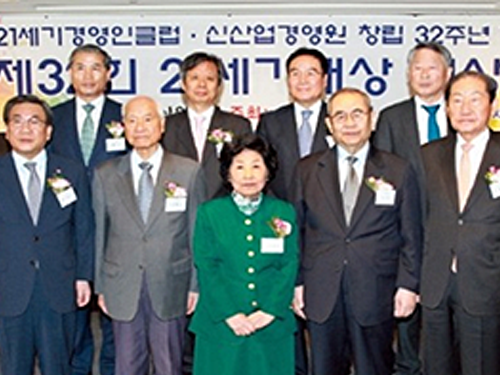 Professor Duck-Joo Lee Awarded the 21st Century Grand Prize
Professor Duck-Joo Lee of the Department of Aerospace Engineering was awarded the 21st Century Grand Prize in the field of technology development by the New Industry Management Academy and the 21st Leaders Club on April 13.
Professor Lee was honored in recognition of his contribution to the helicopter industry. He played a part in domestic helicopter development projects including the KUH-1 Surion (Korean Attack Helicopter), a twin-engine, transport utility helicopter as well as LAH (Light Armed Helicopter) and LCH (Light Civil Helicopter) projects.
Since joining KAIST in 1988, Professor Lee supervised more than 26 PhDs and 27 MSs. He was responsible for hosting the 1st Asian-Australian Rotorcraft Forum and Exhibition and currently serves as vice president of the American Helicopter Society and the Korea Drone Industry Promotion Association. He also participated in open online courses on K-MOOC and Coursera.
(Caption: Professor Lee (second from left in the first row) poses after receiving the award.)
2017.04.26 View 8048
Professor Duck-Joo Lee Awarded the 21st Century Grand Prize
Professor Duck-Joo Lee of the Department of Aerospace Engineering was awarded the 21st Century Grand Prize in the field of technology development by the New Industry Management Academy and the 21st Leaders Club on April 13.
Professor Lee was honored in recognition of his contribution to the helicopter industry. He played a part in domestic helicopter development projects including the KUH-1 Surion (Korean Attack Helicopter), a twin-engine, transport utility helicopter as well as LAH (Light Armed Helicopter) and LCH (Light Civil Helicopter) projects.
Since joining KAIST in 1988, Professor Lee supervised more than 26 PhDs and 27 MSs. He was responsible for hosting the 1st Asian-Australian Rotorcraft Forum and Exhibition and currently serves as vice president of the American Helicopter Society and the Korea Drone Industry Promotion Association. He also participated in open online courses on K-MOOC and Coursera.
(Caption: Professor Lee (second from left in the first row) poses after receiving the award.)
2017.04.26 View 8048 -
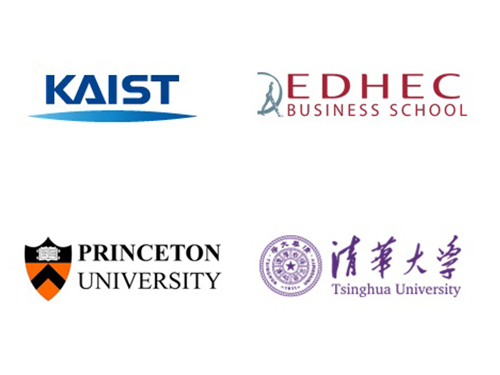 FinTech Conference by KAIST, EDHEC-Risk Institute, Princeton, and Tsinghua
KAIST will partner with EDHEC-Risk Institute, Princeton University, and Tsinghua University to host a series of annual rotation conference on FinTech. The inaugural conference will be held in Princeton on April 26 and is entitled ‘Four-University Rotating FinTech Conference: Wealth Management Systems for Individual Investors.’
The conference will facilitate discussion among all interest parties of academics, practitioners, and regulators from around the world. Professor Woo Chang Kim of the Department of Industrial & Systems Engineering will represent KAIST. Professor Kim is also the head of the Center for Wealth Management Technologies at KAIST.
In addition to Professor Kim, leading experts from the US, Asia, and Europe will present at the conference, including Andrew Yao (Turing Award recipient and founder of IIIS FinTech Center at Tsinghua University), John Bogle (founder of the Vanguard Group, and president of the Bogle Financial Markets Research Center), Lionel Martellini (director of EDHEC-Risk Institute), John Mashey (Bell Labs/Silicon Valley computer scientist/corporate executive), and John Mulvey (professor and founding member of the Bendheim Center for Finance at Princeton University).
This year’s conference will feature following sessions:
· Mass-Customization of Goal-Based Investment Solutions: The New Frontier in Digital Wealth Management Services
· Goal-Based Investment via Multi-Stage Stochastic Goal Programming for Robo-Advisor Services
· Big Data – Yesterday, Today and Tomorrow
· Applying Machine Learning Concepts for Asset Allocation and ALM
· FinTech: Drawing Strengths from Computing Theories
· Savings and Investing to Achieve Retirement Goals: An Update Given Current Market Assumptions · The Rise of Robo-Advisors: A Threat or an Opportunity for the Wealth Management Industry?
The conference will include the participation of official partner Samsung Asset Management.
2017.04.20 View 9306
FinTech Conference by KAIST, EDHEC-Risk Institute, Princeton, and Tsinghua
KAIST will partner with EDHEC-Risk Institute, Princeton University, and Tsinghua University to host a series of annual rotation conference on FinTech. The inaugural conference will be held in Princeton on April 26 and is entitled ‘Four-University Rotating FinTech Conference: Wealth Management Systems for Individual Investors.’
The conference will facilitate discussion among all interest parties of academics, practitioners, and regulators from around the world. Professor Woo Chang Kim of the Department of Industrial & Systems Engineering will represent KAIST. Professor Kim is also the head of the Center for Wealth Management Technologies at KAIST.
In addition to Professor Kim, leading experts from the US, Asia, and Europe will present at the conference, including Andrew Yao (Turing Award recipient and founder of IIIS FinTech Center at Tsinghua University), John Bogle (founder of the Vanguard Group, and president of the Bogle Financial Markets Research Center), Lionel Martellini (director of EDHEC-Risk Institute), John Mashey (Bell Labs/Silicon Valley computer scientist/corporate executive), and John Mulvey (professor and founding member of the Bendheim Center for Finance at Princeton University).
This year’s conference will feature following sessions:
· Mass-Customization of Goal-Based Investment Solutions: The New Frontier in Digital Wealth Management Services
· Goal-Based Investment via Multi-Stage Stochastic Goal Programming for Robo-Advisor Services
· Big Data – Yesterday, Today and Tomorrow
· Applying Machine Learning Concepts for Asset Allocation and ALM
· FinTech: Drawing Strengths from Computing Theories
· Savings and Investing to Achieve Retirement Goals: An Update Given Current Market Assumptions · The Rise of Robo-Advisors: A Threat or an Opportunity for the Wealth Management Industry?
The conference will include the participation of official partner Samsung Asset Management.
2017.04.20 View 9306